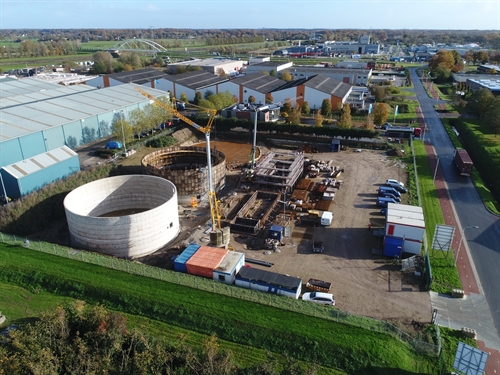The Rijn en IJssel Water Authority has started building a plant in Zutphen to produce a new raw material from purified waste water that can be used in the agricultural, horticultural and concrete industries.
The new raw material has the working title NEO alginate and will be extracted from purified residual water from the Royal FrieslandCampina dairy factories in Borculo and Lochem from spring 2019. The Water Authority and the other partners in the project will thus have a world first and contribute to the transition to a circular economy in the Netherlands.
Nereda® technology
A special water purification process is required to extract the new raw material: Nereda® technology. This is a new, sustainable purification technology. The sludge that remains during the purification of industrial residual water does not form flakes in this process, but granules. Part of these granules is a biopolymer with alginate-like properties. The raw material therefore has the working title NEO alginate for the time being. There are more Nereda® treatment plants in the Netherlands, but they process household wastewater and do not yet have an extraction plant like the one in Zutphen. The Vallei en Veluwe Water Authority and other partners are working together on an installation that will also enable the extraction of these biopolymers from domestic wastewater.
What is Nereda®?
Nereda® is a new, sustainable purification technology in which the purifying, active sludge does not form flakes, but granules. As a result, this sludge settles much quicker and easier. The technology has a high purification efficiency, takes up little space (no large settling tanks needed) and consumes relatively little energy. Furthermore, an alginate-like biopolymer mixture can be recovered from the sludge granules.

Van waterzuivering naar grondstoffabriek
Voor Waterschap Rijn en IJssel is de bouw van de fabriek in Zutphen een manier om een bijdrage te leveren aan een duurzame, circulaire economie. Dijkgraaf Hein Pieper: ‘Klimaatverandering vraagt om een snelle transitie naar een duurzaam Nederland: energieneutraal, circulair en klimaatbestendig. We moeten daar nu maatregelen voor nemen. Dat doen we onder andere door afvalwater niet alleen te zuiveren, maar er ook grondstoffen uit terug te winnen.
Wij en andere waterschappen zijn daarom bezig met het omvormen van onze waterzuiveringen tot Energie- en Grondstoffenfabrieken.’ De bouw van de grondstoffenfabriek wordt mede mogelijk gemaakt dankzij financiële ondersteuning van de provincie Gelderland, het ministerie van Economische Zaken en Klimaat (DEI-programma), en de EU (LIFE-programma).
Een grondstof met unieke eigenschappen
NEO-alginaat (grondstof voor bioplastic met daarin alginezuur, kan gewonnen worden uit organisch afval) is een biologisch product dat gewonnen wordt uit gezuiverd rest- of afvalwater. Het kan water vasthouden, maar ook afstoten. Hierdoor heeft het diverse toepassingen in bijvoorbeeld de land- en tuinbouw en de betonindustrie. Zo kan het gebruik in de landbouw bijdragen aan het verminderen van de uitspoeling van meststoffen. Dit kan ervoor zorgen dat gewassen meststoffen beter opnemen, beter groeien en weerbaarder worden. Een andere mogelijke toepassing is als coating om beton via betere uitharding een langere levensduur te geven.
Bijzondere samenwerking
Het terugwinnen van alginaatachtige biopolymeren (kunststoffen gemaakt van grondstof uit landbouwgewassen en afval) uit afvalwater vindt plaats binnen het Nationaal Alginaat (grondstof voor bioplastic met daarin alginezuur, kan gewonnen worden uit organisch afval) OntwikkelingsProgramma NAOP. In dit programma werken Waterschap Vallei en Veluwe, Waterschap Rijn en IJssel, de Stichting Toegepast Onderzoek Waterbeheer (STOWA (stichting onderzoek waterschappen)), ingenieursbureau RoyalHaskoningDHV en de TU Delft nauw samen.
Alle partijen brengen een deel van de kennis en expertise in die nodig is voor het terugwinnen, verwerken en vermarkten van de nieuwe grondstof. Van laboratoriumonderzoek tot full scale terugwinning. Zo werken waterschap, wetenschap en bedrijfsleven samen aan een duurzame, circulaire economie.